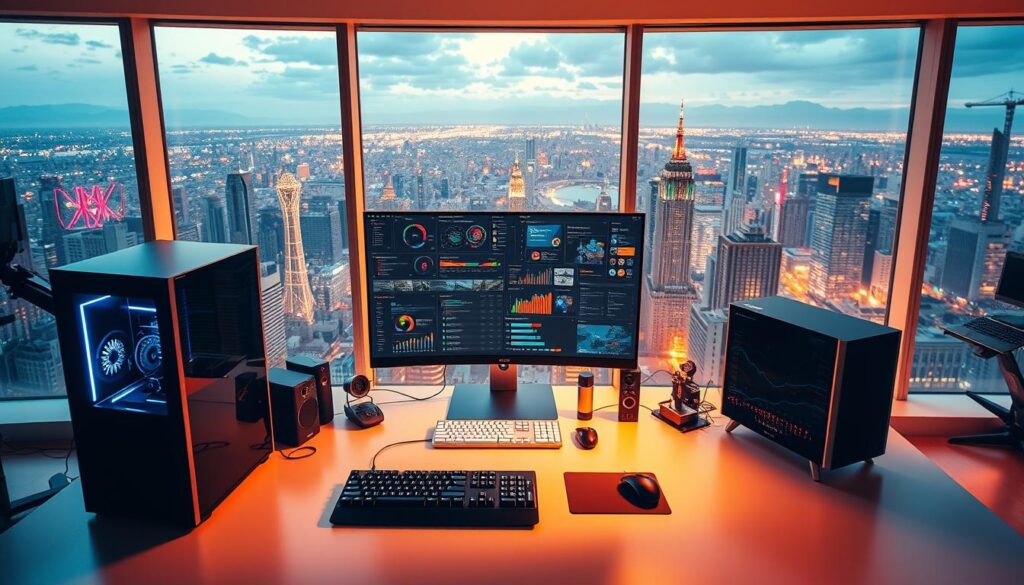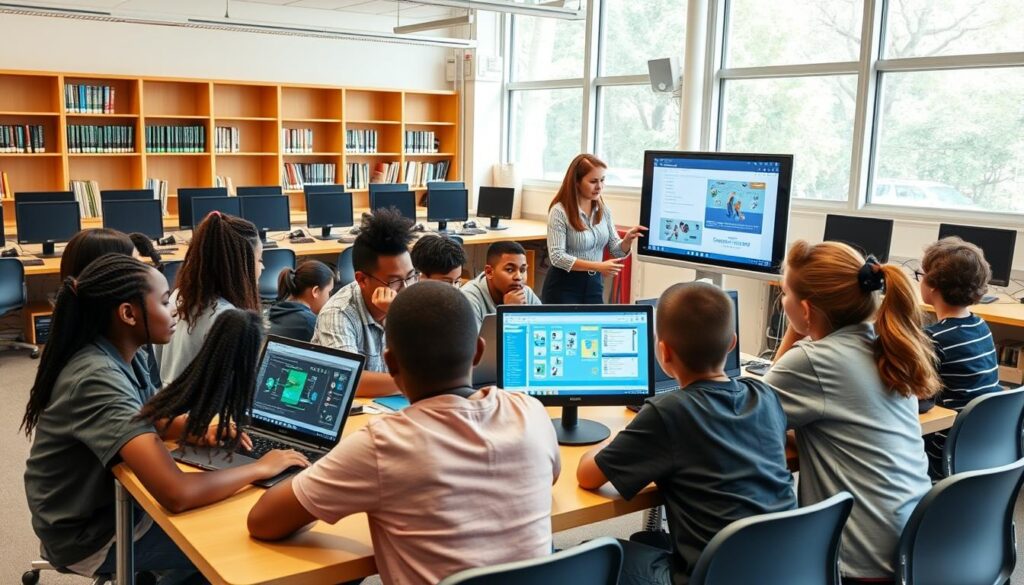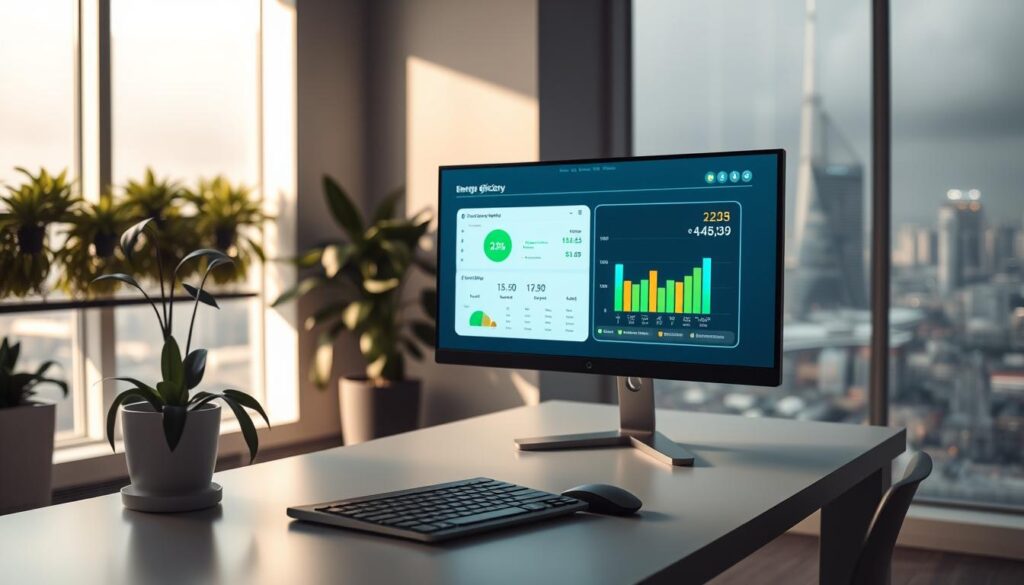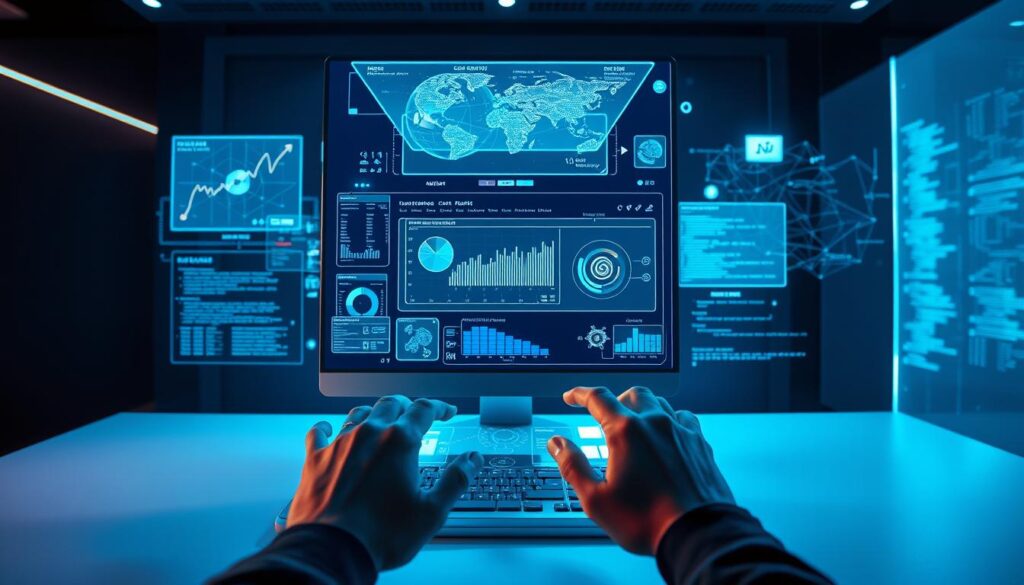Computers are now a big part of our lives, making us more productive and efficient. They offer many benefits, like better communication and more information access. Computers can do millions of calculations without mistakes, changing how we work and live.
About 1 in 3 computer users get repetitive strain injuries. Also, 50%-90% of people who use computers for over two hours a day get eye strain and Computer Vision Syndrome (CVS). Yet, computers are essential in today’s world, bringing many benefits.

Computers greatly impact our lives, making us work better, more accurately, and efficiently. But, we must know the downsides, like data privacy risks and health problems from too much computer use.
Key Takeaways
- Computers offer many benefits that make us more productive and efficient.
- They improve communication, give us more information, and boost productivity.
- About 1 in 3 computer users get repetitive strain injuries, and 50%-90% get eye strain and Computer Vision Syndrome (CVS) from long computer use.
- Computers can do millions of calculations without errors, making them key in many industries.
- The downsides include data privacy risks and health problems from too much computer use.
- Knowing both the good and bad sides of computers helps us use them wisely.
Understanding the Role of Computers in Modern Life
Computers have changed how we live and work. They have made a big impact on our daily lives. From the start of computer history, we’ve seen huge steps forward in technology evolution. Now, we have devices that are faster, smaller, and more powerful.
The technology evolution lets us access lots of information. We can talk to people all over the world and do things more quickly. Computers help us store and use big amounts of data, automate tasks, and make better choices.
Some key benefits of computers in our lives are:
- Increased productivity and efficiency
- Improved communication and connectivity
- Enhanced access to information and education
- Streamlined tasks and automated processes

In conclusion, computers are a big part of our lives today. Their impact will keep growing as technology evolution moves forward. By understanding computers’ role, we can use them to make our lives better and create a brighter future.
| Benefits of Computers | Description |
|---|---|
| Increased Productivity | Computers enable us to perform tasks more efficiently and effectively |
| Improved Communication | Computers facilitate communication and connectivity with people across the globe |
| Enhanced Access to Information | Computers provide access to a vast amount of information and educational resources |
How Computers Transform Work Efficiency
Computers have changed how we work, bringing many computer benefits that boost work efficiency. They can do millions of calculations in a second, much faster than humans. This means we can get more done in less time.
Computers also make our work more accurate. Most mistakes come from user errors. Plus, they can hold a lot of data, saving money on storage. Some main ways computers improve work efficiency are:
- Streamlining tasks and improving productivity
- Enhancing communication and collaboration among team members
- Providing access to vast amounts of information and data

By using these computer benefits, businesses can work more efficiently. This leads to better productivity and staying competitive. As technology keeps getting better, it’s key for companies to keep up with new computer tech.
Educational Benefits of Computer Usage
Computer education has changed how we learn. Now, online learning lets students access many courses and resources worldwide. This is great for students who couldn’t get quality education before.
Some key benefits of computer education are:
- More access to educational resources, like online courses and digital libraries
- Students are more engaged and motivated with interactive tools and multimedia
- Online platforms and digital tools help students and teachers work together better
Online Learning Opportunities
Online learning lets students learn at their own speed, with courses and tutorials available anytime. This is good for students with busy lives or who like to learn on their own.

Digital Research Capabilities
Digital research has improved a lot. Online libraries and databases offer a huge amount of information. This makes it easier for students to do research and finish assignments, with reliable sources just a click away.
Economic Impact of Computer Integration
The use of computers has greatly changed the computer economy. It has led to new jobs and industries. About 50% of the developing world now has digital access, showing a big technology impact on the global economy.
The internet industry has brought new job types, like promotion and search engine specialists. Also, every $1 billion in IT spending creates 18,000 jobs. This shows computers’ positive effect on work.
Some important stats on computer integration’s economic impact are:
- More demand for skilled workers because of ICT
- Higher unemployment for less educated workers in both rich and poor countries
- More jobs in less developed countries due to technology growth

Globalization, driven by ICT, has made the world more connected. It has increased information, goods, and service flow across borders. As technology impact shapes the computer economy, understanding its effects on work and economy is key.
| Category | Statistic |
|---|---|
| Internet Access | 50% of the developing world’s population has access to digital technologies within two decades |
| Job Creation | Every additional $1 billion spent on IT creates 18,000 jobs |
| Unemployment Rate | A notable increase in the unemployment rate for less educated workers in both developed and developing countries |
Communication and Connectivity Benefits
Computer communication has changed how we connect with others. It’s easier to keep in touch with friends and family worldwide. Social media lets us share our lives with many people, creating a global community.
The internet makes communication fast. Emails and texts let us talk instantly, no matter where we are.

This makes things easier and cheaper for them. Social media helps businesses reach more people, boosting their online presence.
Global Networking Possibilities
Computers connect us with people worldwide. This has opened up new job fields like system analysts and web designers. The internet also brings different cultures together, shaping global trends.
Real-time Communication Tools
Tools like video calls and instant messaging make talking to others easy, no matter where they are. This boosts productivity and teamwork. It also helps businesses offer better customer service, making interactions more personal.
Social Media Integration
Social media is key in computer communication. It lets us share our lives with many. This helps businesses grow their online presence. But, it also raises privacy and security concerns. We need to make the internet safer for everyone.
Environmental Implications of Computer Use
Computers have a big impact on our planet. It’s important to think about how our daily use affects the environment. The making and throwing away of computers, plus the energy they use, all harm our planet.
Some scary facts show we need to be more careful. Cloud providers now cause more pollution than all airlines together. Also, a single desktop computer can release about 200 kg of CO2 during its life.
To lessen the harm computers do to the environment, we must act. This means recycling old tech and using green energy. Here are some ways to help:
- Turn off computers and other devices when not in use to reduce energy consumption
- Recycle electronic waste to minimize the amount of hazardous materials that end up in landfills
- Use renewable energy sources, such as solar power, to reduce reliance on fossil fuels

By doing these things, we can make computers less harmful to our planet. This way, we can ensure a better future for all.
| Device | Carbon Footprint (kg CO2e) |
|---|---|
| Desktop + screen | 621 |
| Laptop + screen | 691 |
| Desktop + 2 screens | 903 |
Health Concerns Related to Computer Usage
Computer health is a growing concern as technology impacts our lives more. Prolonged computer use can cause physical health issues. These include Repetitive Strain Injury (RSI), tendonitis, and carpal tunnel syndrome.
RSI is common in jobs that involve repetitive movements. Symptoms include tingling or loss of sensation in fingers and pain in the wrist, elbow, shoulder, or neck. To prevent RSI, take 30-60 second breaks every 10 minutes. Also, get up and stretch or move around every hour during long computer use.
Some ways to reduce the risk of computer-related health issues include:
- Maintaining an elbow angle of at least 90° when using a keyboard
- Keeping the monitor about an arm’s length away from the user’s face
- Using ergonomic keyboards and mice to minimize wrist strain

By being aware of these health concerns and taking steps to prevent them, we can promote better computer health. This reduces the negative impact of technology on our lives.
| Health Issue | Symptoms | Prevention |
|---|---|---|
| RSI | Tingling or loss of sensation in fingers, pain in the wrist, elbow, shoulder, or neck | Take regular breaks, maintain good posture |
| Carpal Tunnel Syndrome | Intermittent numbness, tingling, and pain in the hand | Use ergonomic keyboards and mice, take regular breaks |
Security and Privacy Challenges
As technology gets better, computer security is a big worry. More technology risks mean more cyber attacks and data breaches. A new cyber attack happens every 40 seconds. The average cost of a data breach is expected to be $4.88 million in 2024.
To fight these risks, companies use multifactor authentication and update their security often. But, human mistakes are a big problem. This shows we need to train employees well. Some important stats on security and privacy challenges are:
- Over 90% of data breaches are caused by human error.
- 60% of small businesses that experience a data breach go out of business within six months.
- The global cybersecurity market is expected to reach $345 billion by 2026.
Companies need to be open about how they collect data. They must follow industry rules to avoid fines and legal trouble. By spending on cybersecurity and following good practices, companies can lower the chance of data theft. This helps them avoid big financial losses.

Advantages and Disadvantages of Using Computer in Business
Computers have changed how businesses work, bringing many technology benefits. They can process information much faster than humans, helping make decisions quicker. They also store data in huge amounts, making complex calculations easier.
Using computers in business has made operations 20% more efficient, studies show. But, the start-up costs and the need for expert help can be big downsides. Buying computer equipment can cost between $2,000 and $5,000. Hiring experts can cost $100 to $250 an hour.
Some main benefits of using computers in business are:
- Improved decision-making efficiency
- Increased operational efficiency
- Enhanced data storage and processing capabilities
But, there are also challenges. Computers can be vulnerable to cyber attacks, and businesses need strong security. A study found 43% of cyber attacks target small businesses, showing the need for data protection.

In summary, computers have both good and bad sides for businesses. They offer many technology benefits and boost efficiency. Yet, they require a lot of money and can pose security risks. Businesses must think carefully about using computers and find ways to overcome any problems.
Impact on Personal Relationships
Computer relationships and technology have changed how we connect today. Social media and online chats have made us more connected than ever. But, this raises questions about the quality of these connections.
Studies show that 70% of adults say tech helps them stay in touch with loved ones, no matter where they are. Also, 60% of people feel their bonds are stronger because they can share moments instantly online.
Some interesting facts about tech’s role in relationships include:
- 53% of couples say tech use hurts their face-to-face talks
- 45% have trust issues because of online stuff or digital misunderstandings
- 88% think having tech-free times is key to deeper connection with partners

In summary, tech can both help and hurt our personal ties. It’s vital to find a balance between online and real-life interactions for strong, meaningful relationships.
| Statistic | Percentage |
|---|---|
| Adults who claim technology helps them stay connected | 70% |
| Individuals who feel their relationships are stronger due to technology | 60% |
| Couples who report negative effects on face-to-face communication | 53% |
Computer Addiction and Digital Dependency
Computer addiction and digital dependency are big issues today. Research suggests that Internet Addiction Disorder (IAD) affects 1.5% to 8.2% of people in the U.S. and Europe. This can cause serious problems, like health, mental, and social issues.
Some signs of computer addiction and digital dependency include:
- Using the internet too much, ignoring important tasks and relationships
- Feeling guilty, anxious, or depressed without the internet
- Physical issues like back pain, neck problems, and eye strain from too much screen time
Dr. Kimberly S. Young’s Internet Addict Diagnostic Questionnaire (IADQ) shows signs of online addiction.

To fight computer addiction and digital dependency, it’s key to know the signs and get help. Treatment might include medicines for emotional issues, like escitalopram, and therapy to find the root of addiction.
| Prevalence Rate | Population | Source |
|---|---|---|
| 1.5% – 8.2% | United States and Europe | Statistical data |
| 25% | Children | Studies |
Financial Aspects of Computer Ownership
Thinking about the money side of owning a computer is key. You need to look at the computer cost and the value of technology investment. The cost of buying a computer is just the start. You also have to think about ongoing costs like maintenance, upgrades, and repairs.
Recent stats show that fixing a computer can cost between $100 and $400. This depends on the problem.
For both people and businesses, investing in technology can save money in the long run. For instance, businesses can cut their costs by about 30% by using computers. Computers also make tasks faster and more accurate, reducing errors.
Some important money matters to think about when owning a computer include:
- Initial purchase price
- Ongoing maintenance and repair costs
- Upgrade frequency and associated costs
- Potential for cost savings through increased efficiency and accuracy

By carefully looking at these points and making smart choices about computer cost and technology investment, you can get the most financial benefits. This way, you can avoid any downsides.
Future Implications of Computer Dependency
Technology is changing fast, shaping our lives and work. We’re getting more dependent on computers and the internet. It’s important to think about what this means for us.
Technology trends are changing how we talk and get information. This is just the start of how computers will affect us.
Some important areas to watch in the future include:
- Artificial intelligence and machine learning
- Internet of Things (IoT) and connected devices
- Cybersecurity and data protection
- Digital literacy and education
As we look ahead, staying up-to-date with technology trends is key. Understanding computer dependency helps us prepare for the future. It ensures we use technology for everyone’s good.

| Area | Potential Impact |
|---|---|
| Artificial Intelligence | Increased automation and efficiency |
| Internet of Things (IoT) | Improved connectivity and convenience |
| Cybersecurity | Enhanced data protection and security |
Balancing Computer Usage in Daily Life
It’s key to find a balance with computers in our digital world. Technology use is everywhere, and we need to set limits. Studies show too much screen time can cause eye strain, hand pain, and sleep issues.
Breaking up computer time with physical activity is important. Try simple exercises like stretching or short walks. Also, make sure to have device-free times, like during meals and exercise.
Here are some tips for better computer balance:
- Don’t use devices during meals and social times.
- Make time for physical activities like walking or exercise.
- Have device-free times for relaxation and fun.
Using these tips can help avoid eye strain, sleep loss, and less physical activity. It’s vital to keep a balance with computers for a healthy life.

The American Academy of Pediatrics says kids 2 to 5 should watch screens for only one hour a day. This shows the need for parents to set good examples and limits on computer balance.
| Age Group | Recommended Screen Time |
|---|---|
| 2-5 years | 1 hour per day |
| 6-12 years | 2 hours per day |
| 13-18 years | 3 hours per day |
By focusing on computer balance and smart technology use, we can avoid the dangers of too much screen time. This helps us stay healthy and productive.
Conclusion
Technology has become a big part of our lives. Computers have changed how we work, learn, and talk to each other. It’s important to use them wisely. Computer conclusion and technology summary show we need to use technology carefully.
Computers have made us more productive and given us easy access to information. But, they can also harm our health. We need to watch out for eye problems, injuries from repetitive actions, and addiction to screens.
To stay healthy, we should balance computer time with exercise, talking to people, and hobbies without screens. This helps us live a balanced life.
As technology keeps getting better, we must learn to use it well. We should know how to use it without letting it control us. Understanding and using computers wisely is important for our health and the future of technology.
FAQ
What is the evolution of computer usage?
The article looks at how computers have evolved. It starts with the early days of computing and moves to today’s digital revolution. It shows how computers have changed our lives and work.
How have computers transformed work efficiency?
Computers have made work better and faster. They automate tasks and give us access to lots of information.
What are the educational benefits of computer usage?
Computers have made learning better. They offer online classes, interactive tools, and help with research.
What is the economic impact of computer integration?
Computers have helped the economy grow. They’ve created new jobs and industries, and boosted e-commerce.
How have computers improved communication and connectivity?
Computers have made talking to people around the world easier. They offer tools for real-time chat and social media.
What are the environmental implications of computer use?
Computers can harm the environment. They produce e-waste and use a lot of energy. We need to use them in a way that’s good for the planet.
What are the health concerns related to computer usage?
Computers can be bad for our health. They can cause physical and mental problems. But, we can take steps to stay healthy.
What are the security and privacy challenges related to computer usage?
Computers can be risky. They can expose our personal info. We need to protect ourselves with good cybersecurity.
What are the advantages and disadvantages of using computers in business?
Computers help businesses in many ways. They can save money and make work easier. But, they also come with challenges like cost and setup.
How have computers impacted personal relationships?
Computers have changed how we connect with others. They’ve helped us build online communities and use social media.
What is computer addiction and digital dependency?
Computer addiction is when we spend too much time online. It’s important to know the signs and find ways to stop it.
What are the financial aspects of computer ownership?
Buying a computer can cost a lot. It’s also important to keep it running well. We need to budget for these expenses.
What are the future implications of computer dependency?
As we rely more on computers, we need to think about the future. We should watch for new tech trends and adapt to change.
How can we balance computer usage in daily life?
It’s key to use computers wisely. We should set limits, balance work and play, and stay active. This helps us use technology in a healthy way.